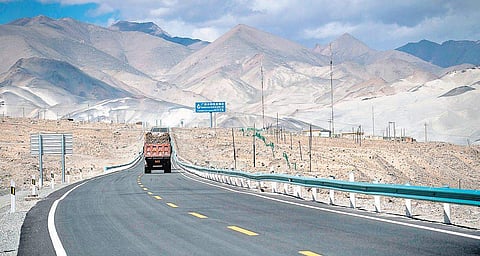

NEW DELHI: Chinese President Xi Jinping’s signature Belt and Road Initiative (BRI) is going through a rough stretch. Over the past few months, countries like Malaysia, Myanmar, the Maldives and Nepal have either cancelled or put on hold several projects in their countries related to the massive inter-continental connectivity project.
Several central Asian and African nations are also reviewing their commitment to the project. Some estimates say that projects worth more than $30 billion have been scrapped so far and other loans and investments are under review. Even Pakistan, a close ally of China, has proposed a significant recasting of the terms of the China Pakistan Economic Corridor (CPEC), a key section of the BRI, and set up a nine-member committee to review the entire project.
The pushback comes at a time comes at a time when Beijing faces a trade war with the United States (US) and increasing western aggression and anti-China alliances in the South China Sea. Meanwhile, the US, the European Union (EU) and India have all initiated infrastructure and development programmes aimed at diluting China’s “dollar diplomacy.”
While India has revived an interest in the Bay of Bengal Initiative for Multi-Sectoral Technical and Economic Cooperation (BIMSTEC), which aims to ramp up economic cooperation among nations along the Bay of Bengal and littoral states, the EU, which has been suspicious of China’s BRI intentions, has launched a new Connectivity Strategy which seeks to link Europe and Asia economically, digitally and culturally. At the same time, the US has quietly set up a new foreign aid agency — the United States International Development Finance Corporation — which aims to provide $60 billion in loans, loan guarantees and insurance to companies willing to do business in developing nations.
Speaking to the Voice of America, Oh Ei Sun of the Singapore Institute of International Affairs referred to these continuing cancellations and the ever-shifting landscape of Chinese global investment as a case of “Belt and Road indigestion.”However, he also felt that concerns about debt traps and debt diplomacy will not have an impact on China going forward, even though stops, starts and cancellations will continue.
Bhaskar Roy, a former intelligence officer who has served in China, concurs, saying that Beijing would follow Mao’s dictum of ‘two steps forward, one step back’ which ensures that it is always at least one step ahead while seemingly conceding to opposing interests.
Another Indian official believes that for China, and Xi in particular, the BRI is “too big to fail,” and that despite all the pushback and opposition in some quarters, “there will always be countries able and amenable to the idea of easy money from China, debt traps be damned.” According to him, “while everyone cites Sri Lanka’s Hambantota port complex as a classic example of the Chinese “debt trap” they forget that it is but one of 42 or more ports that China has invested in, from the Pacific all the way to Africa and Europe. Djibouti, where China has already set up a military base, is probably going to be the next Hambantota.”